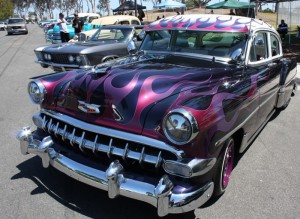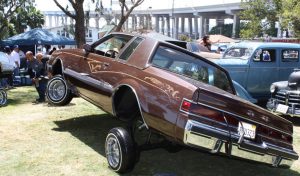Riding Low: From the Old School to the New
Part III

Lowriding has evolved so much that nowadays the explanation of what makes a car a lowrider cannot be simplified or limited to one definition. Those from the old school who favor cars made prior to the 1950’s tend to have stricter guidelines when it comes to defining a lowrider. Rigo Reyes of Amigos Car Club believes there are four vehicles which epitomize the essence of a lowrider car: A 1964 Super Sport/convertible Chevy Impala; a 1954 Chevy Bel Air; a 1948 Fleetline; and a 1939 Chevy. In addition to the cars are its features. For Rigo hydraulics, the paint job, and 5.20’s Premium Sportway tires are some of the features that define a true lowrider because they are very original.
One of the realities of lowriding that makes the new generation different from the old school is the number of options that are available to them. Over the past 30 years the media has been instrumental in placing lowriding into the public eye, which in turn has commercialized it into a multi-million dollar industry. One of the outcomes of its commericalization are industries that cater specifically to the lowrider. When lowriding began nearly 70 years ago lowriders customized their cars with very limited resources. A part of the art of lowriding was making something eye popping and beautiful with very little means.

Today when it comes to parts and possibilities the options are seemingly endless, from the technological advancements of hydraulics that allow cars to hop several feet in the air to a range of paint styles including candies, pearls, metal flakes, metallics, or stock, dependent upon if one desires a flashy or more conservative look. In addition, there are various tire sizes and the use of larger wheels, as well as air bags, something that to the old school is not a part of the lowrider tradition. For Rigo and other members of the old school they question how some of these features fit into the lowrider culture. “To us they are not considered lowriders, but who are we to say that? Maybe they do consider themselves lowriders, it’s just their own style.”
When it comes to the style of a lowrider car there are several niches and specialties that lowrider enthusiasts follow, dependent upon their interests. These niches vary from Bombs (a traditional symbol of the WWII era), Euro’s (primarily Japanese and import cars), Hot Rods (of the 40’s and 50’s racing era), SUV’s, mini trucks, and bikes. Whether or not a particular style is considered worthy of the term lowrider is up for debate. What most lowriders do agree upon is that standards in the world of lowriding are hard to accept because the culture itself was founded upon the very act of breaking away from the norm, the regulated, the clearly defined, in order to be distinct, bold and self-defined. The lowrider culture has always been transcendent in that it is both culturally specific and universal. It creates within the lines, and at the same time redefines them.
Next week Part IV: Riding Low: Lowriding, A Way of Life





